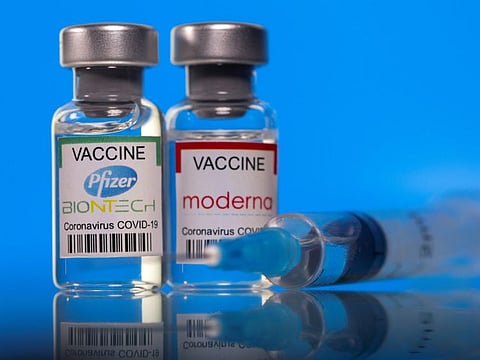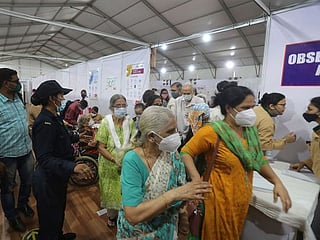You Pfizer, me Moderna: Vaccine recipients in America declare loyalty
Many Americans are getting quite attached to the companies that made their shots

Also In This Package
New York: “I’m in a mixed marriage,” tweeted David Thomas, 51. “I got Pfizer, and my wife is getting the Moderna vaccine today. How will this affect our kids?”
Thomas, who works in printing and lives in Plymouth, Michigan, was clearly joking. “Just pretending like we care which vaccine we got makes it fun,” he said. “It’s like a game to say, ‘I’m on Team Pfizer’ or ‘I’m on Team Moderna.’”
But, suffused with relief after a year of isolation and loss, many people are getting quite attached to the companies that made their shots, some even buying T-shirts that broadcast the tribe they’ve “joined” (call it pharmcore).
The three COVID-19 vaccines available in America are remarkably effective. As the Centres for Disease Control and Prevention puts it, “The best COVID-19 vaccine is the first one that is available to you.” Most people aren’t even in a position to choose which one they get. “It’s like the sorting hat in ‘Harry Potter,’” said Thomas.
Still, a friendly rivalry has taken hold across America with vaccinated people professing loyalty to the brand they happened to have received.
Playful rivalry
Selfies with vaccine cards now come with the caption #TeamPfizer or #TeamModerna. TikTokers making fun of the brands they didn’t receive are going viral. And some people joining in the playful rivalry are questioning their privilege, asking themselves why they care and how their posturing might look to others in the world who have no vaccine at all.
When Beth Wilensky, 48, a law professor at the University of Michigan in Ann Arbor, was given a last-minute vaccine slot at a nearby Walmart last month, she didn’t care which vaccine she received. “The numbers were going up here,” she said. “I was thrilled to get any of them.”
A few weeks later, the CDC announced it would pause the use of the Johnson & Johnson vaccine, the one she received. Rather than feel fear, however, Wilensky felt defiant. “As someone who got the J&J, I want to shout to rooftops how happy I am,” she tweeted. “Maybe I should start a J&J fan club to show some love to this unfairly maligned vaccine?”
She believes her loyalty comes from deep gratitude for relief from worry. “I got the shot, and two weeks later, I felt very confident I wasn’t going to get severely ill,” she said.
There is also loyalty. “There are so few people who got J&J compared to the other vaccines, that there is a little bit of a ‘We are small but mighty’ thing,” she said.
When people announce they have received a COVID-19 vaccination, others usually respond by asking which one. Wilensky has a theory about why people even bother to ask. “Vaccine clinics are these amazing sites where people feel relief after a year of anxiety and devastation,” she said. “People are looking for a way to keep talking about such a positive thing.”
Linda Hirshman, whose book “Victory: The Triumphant Gay Revolution” explores the AIDS pandemic, is fully on team Pfizer. “I am a complete fan girl of science. As to the Pfizer brand, I love them,” she said. “It’s funny. I am not fussy about which pneumonia vaccine I get.”
Unlike the flu shot, which seems to just appear at the end of the summer, many in isolation have been following every move of these pharmaceutical companies during the pandemic - eagerly awaiting every trial result, every announcement - to see if they could pull off the scientific marvel that would bring us life back to something like normal.
“It was the race for the cure,” Hirshman said. “We will now cheer for whoever got it done for us.
“What do people do when they get a miracle? It’s a little weird to go to the temple and thank God for the mRNA vaccine, so they thank Pfizer or Moderna instead.”
'Pfizer alumni'
Sam Lee of San Diego and Luke Brewer of Lansing, Michigan, opened a shop on Etsy named ViralMerchCo three weeks ago, mostly to sell T-shirts and sweatshirts that advertise a vaccine brand. The items say phrases such as “Pfizer alumni” and come in a range of colours.
“We saw ‘vaccinated’ posts all over social media. Many of the people posting also posted which vaccine they received, and it seemed like people took a lot of pride in this,” Lee said. “We gave the people what they were looking for.” They said they have almost 100 items, and other Etsy shops provide similar apparel.
Ellyn Marsh, a Broadway actress, knew she struck a chord when she posted a video on TikTok in which she was pretending to dance in a club and bragging over the music about which vaccine she got. “It got a million and a half views really quickly,” she said. “I was like, ‘OK, this is something people want to talk about.’”
Sign up for the Daily Briefing
Get the latest news and updates straight to your inbox









